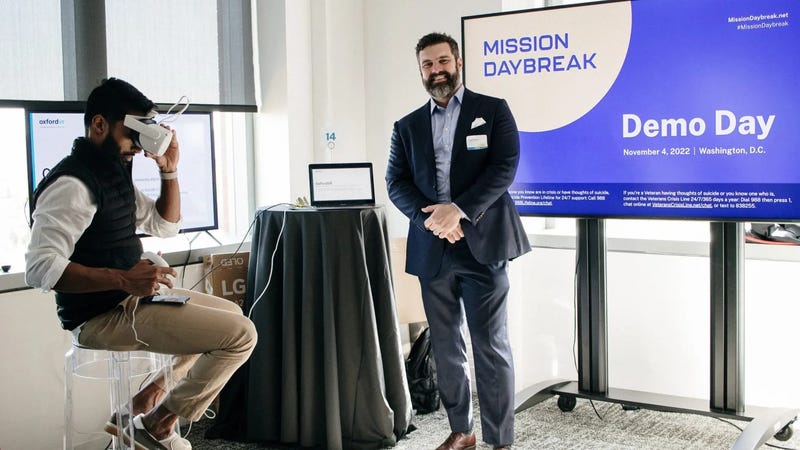
The 10 winners of the Department of Veterans Affairs' $20 million challenge to end veteran suicide were announced last week.
VA launched the multiphase Mission Daybreak in May 2022 and received more than 1,300 concept submissions in Phase 1 from veterans, Veteran Service Organizations, community-based organizations, health tech companies, startups and universities.

“By drawing on a range of focus areas and life experiences, the Mission Daybreak winners have developed innovations that will save veterans' lives and there’s nothing more important than that,” said VA Unde Secretary for Health Dr. Shereef Elnahal in a statement.
The multidisciplinary judging panel included veterans, clinicians, social workers and technical experts who evaluated submissions from the 30 Phase 2 finalists and recommended the 10 winners based on official evaluation criteria.
The two first-place winners will each receive $3 million:
- Stop Soldier Suicide’s “Black Box Project” is a technology solution that identifies and analyzes data from digital devices of veterans who died by suicide to develop machine learning models that can identify never-before-known risk patterns. Paired with evidence-based, suicide-specific intervention services, the Black Box Project will accelerate precision methodologies in suicide prevention for the veteran community.
- Televeda’s “Project Hózhó” is the first mental health app and comprehensive operational plan for American Indian and Alaska Native populations. The tool was designed in partnership with AIAN and veteran communities for Navajo veterans with plans to adapt and expand for use with other tribes. The solution incorporates traditional healing practices like storytelling and talking-circle interventions to reduce Veteran suicide and improve access to VA resources.
Amanda Lienau, director of data analytics and innovation at the Veterans Health Administration Innovation ecosystem told reporters on Feb. 14 that what set the top two prize winners apart was their dedication to learning and curiosity to partner with veterans and communities in order to develop suicide prevention solutions.
“Their willingness to engage deeply and to take the perspective of veterans and people who are deeply steeped in this work as they develop their solution was really powerful and impactful,” she added.
The three second-place winners will each receive $1 million:
- ReflexAI is an artificial intelligence-powered tool that can help the Veterans Crisis Line train and maintain a team of responders that can meet the needs of every veteran who reaches out. The tool utilizes a three-pronged approach of simulation, feedback, and quality assurance, which is nationally recognized as an innovative and responsible use of AI in crisis services.
- Sentinel is a mobile app designed to reduce veteran suicide by encouraging safe storage of firearms. The application integrates smart firearm and medication locking devices with a veteran-specific learning and community support network that facilitates strong connections with other veterans, family and friends.
- Battle Buddy is a virtual human-led mental health and wellness application that promotes resiliency among veterans at risk for suicide. Its interactive, conversational AI utilizes content from VA’s Suicide Safety Planning program during brief daily check-ins with veterans. The mobile application will also connect with wearable sensors to leverage sleep, exercise, and other health signals. Battle Buddy is a partnership between the USC Institute for Creative Technologies and the SoldierStrong Foundation.
The five third-place winners will each receive $500,000:
- Even Health’s “Cabana” is a virtual reality-based group support platform for veterans who have survived a suicide attempt. It adapts an established support group model shown to reduce suicide and associated factors as well as increase resilience and a sense of belonging.
- NeuroFlow is a two-sided technology platform that offers veterans tailored resources and digital care 24/7 while measuring their evolving behavioral health needs to inform care teams of potential crises before they happen. Providing virtual and in-person support for veterans who would typically fall through the cracks, it assesses and triages veterans and caregivers to get them to the right level of behavioral health care and community services based on their available benefits, geography and clinical presentation.
- Overwatch Project is a peer-based intervention program that empowers veterans to intervene with at-risk buddies, offering to temporarily hold onto their guns or take protective storage measures before it is too late. The program includes training, community engagement and communications initiatives crafted in a direct, authentic veteran voice. It aims to transform the conversation about firearms and suicide prevention through an approach modeled after the “Friends Don’t Let Friends Drive Drunk” campaign.
- OxfordVR’s “gameChange,” a digital therapeutic with the Food and Drug Administration’s Breakthrough Device designation, treats severe social isolation. Through virtual reality, it offers an immersive and scalable opportunity to treat veterans where they are before a crisis moment.
- Team Guidehouse’s data platform integrates social determinants of health and social media data into the health record and an external dashboard to identify veterans at risk in real-time; it also provides actionable insights for suicide prevention.
To learn more, visit here.
Reach Julia LeDoux at Julia@connectingvets.com.



